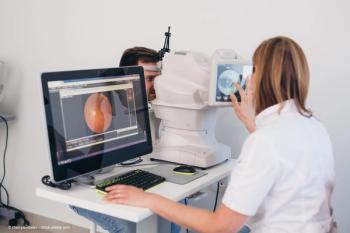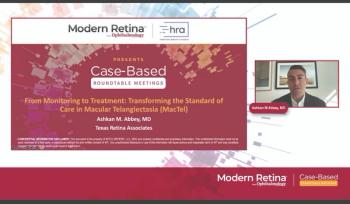
EYP-1901 introduces treat-to-maintain paradigm for anti-VEGF therapy
EyePoint Pharmaceuticals hopes to usher in a new paradigm of retinal eye disease treatments with their candidate EYP-1901.
During the Retina Unplugged panel at Retina World Congress, Nancy Luker presented on new pathways in retinal diseases. She outlined how EYP-1901, EyePoint Pharmaceuticals’ candidate for the new treat-to-maintain paradigm they hope to begin. EYP-1901 combines vorolanib, a tyrosine kinase inhibitor anti-VEGF, with a bioerodible retinal implant (Durasert, EyePointPharmaceuticals).
Nancy Lurker is the CEO of EyePoint Pharmaceuticals.
Video transcript
Hi, I'm Nancy Lurker. I'm the president and CEO of EyePoint Pharmaceuticals here at Retina World Congress and I just had a panel discussion today at Retina Unplugged.
We're pretty excited about our EYP-1901, which we do believe, if approved, could be a new paradigm in how retinal eye diseases are treated. It's a combination of vorolanib, a tyrosine kinase inhibitor anti-VEGF, paired up with our Durasert technology, which has been used in four FDA-approved drugs. It's a bioerodible Durasert.
The combination of those two products in our Phase 1 DAVIO trial showed that we got very nice safety results, coupled with efficacy data showing stable BCVA, and we were able to get 53% of patients out to six months. And now we released our nine month data, 41% out to nine months with no additional supplemental anti-VEGF therapy.
The difference in the paradigm is this is really treat to maintain. So it's different from what you have typically seen with other anti-VEGF where we are wanting patients to get stabilized on whatever current anti-VEGF you're using. And then for those patients who are stable, put them on potentially EYP-1901 to be able to get them out to six months or longer with no additional supplemental therapy.
So we're pretty excited about our prospects here. We're happy to say we're entering phase two clinical studies in third quarter of this year. We also will be studying nonproliferative diabetic retinopathy with the first patient in the second half of this year. And now we just announced we'll be entering into diabetic macular edema, as well, in 2023. Thank you very much. We're excited about our future.
Note: This transcript has been lightly edited for clarity.
Newsletter
Keep your retina practice on the forefront—subscribe for expert analysis and emerging trends in retinal disease management.



























